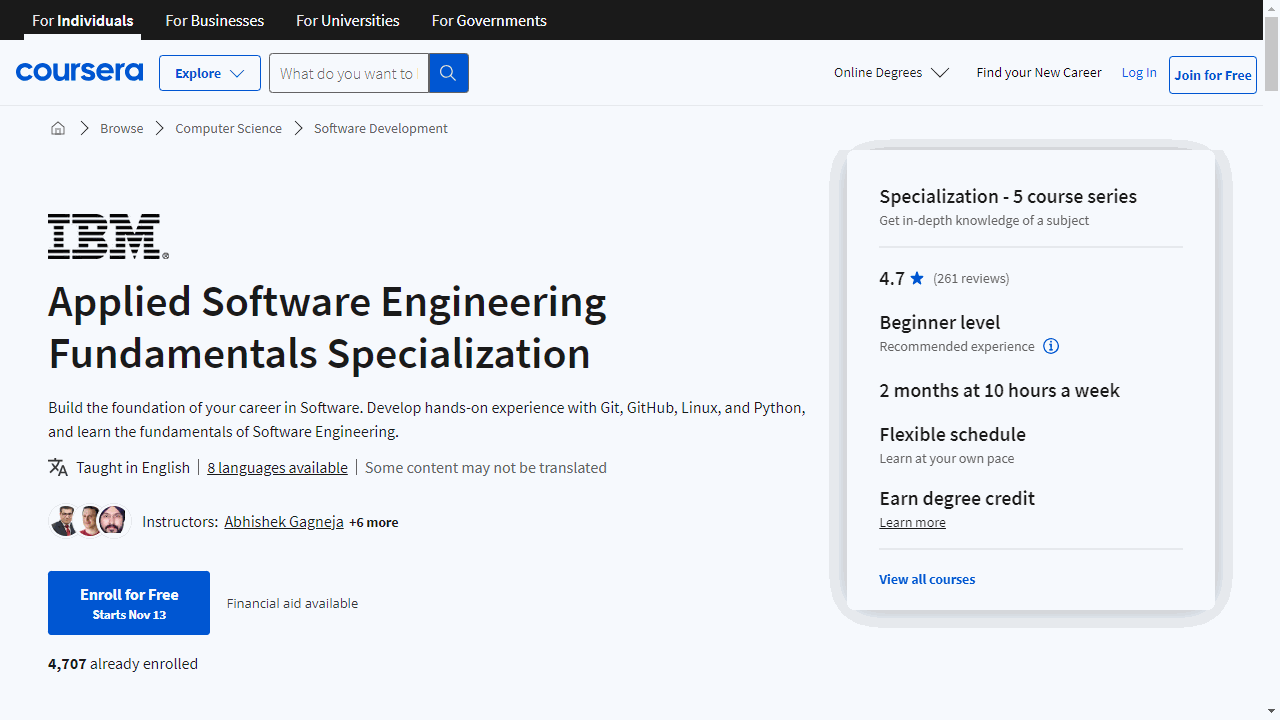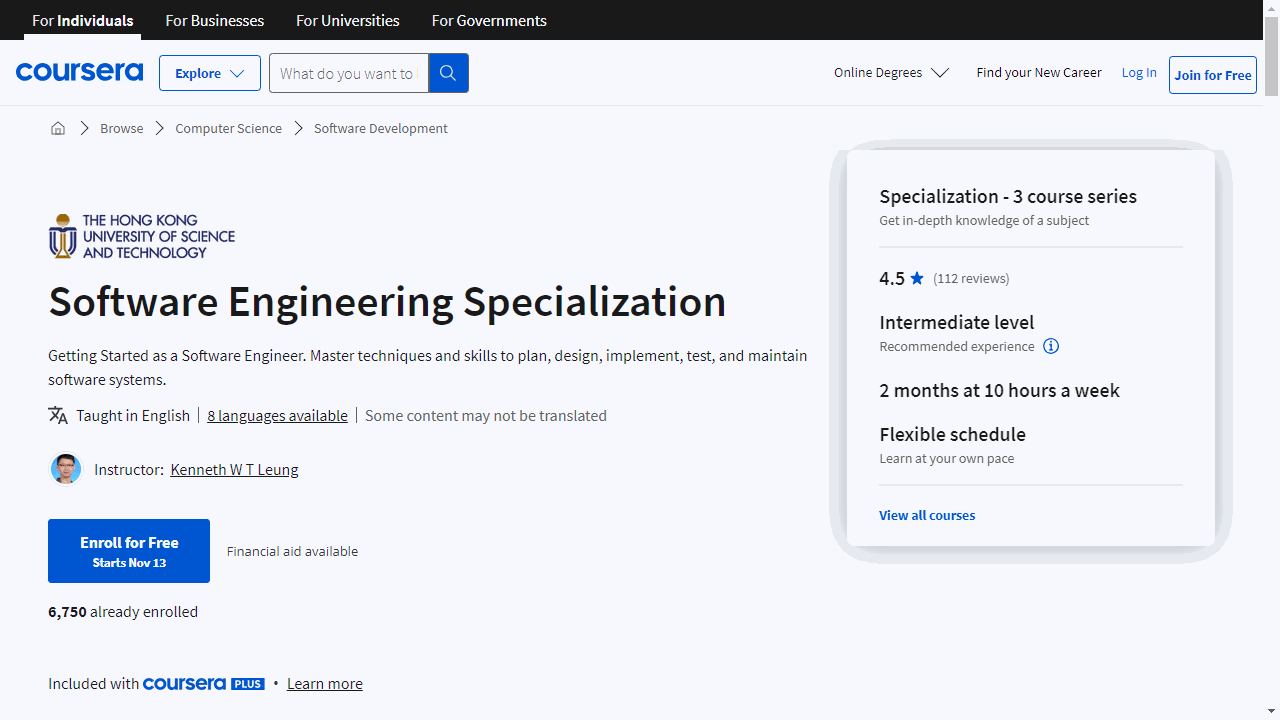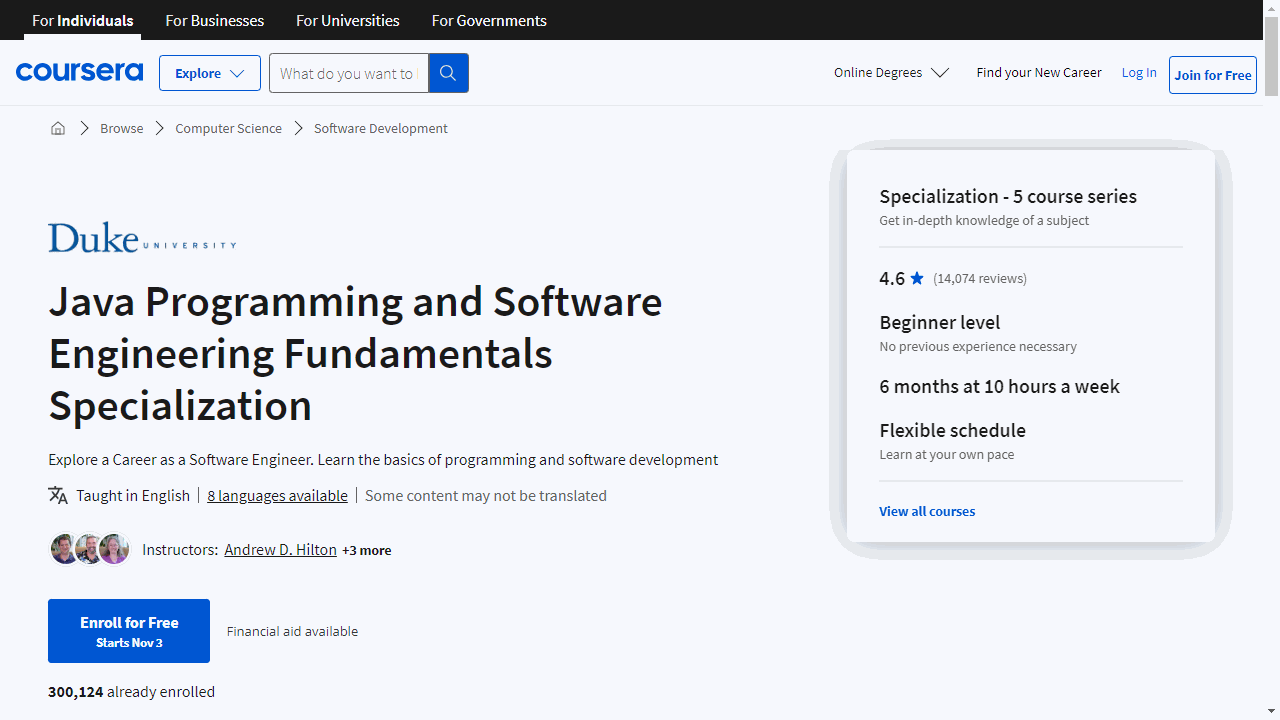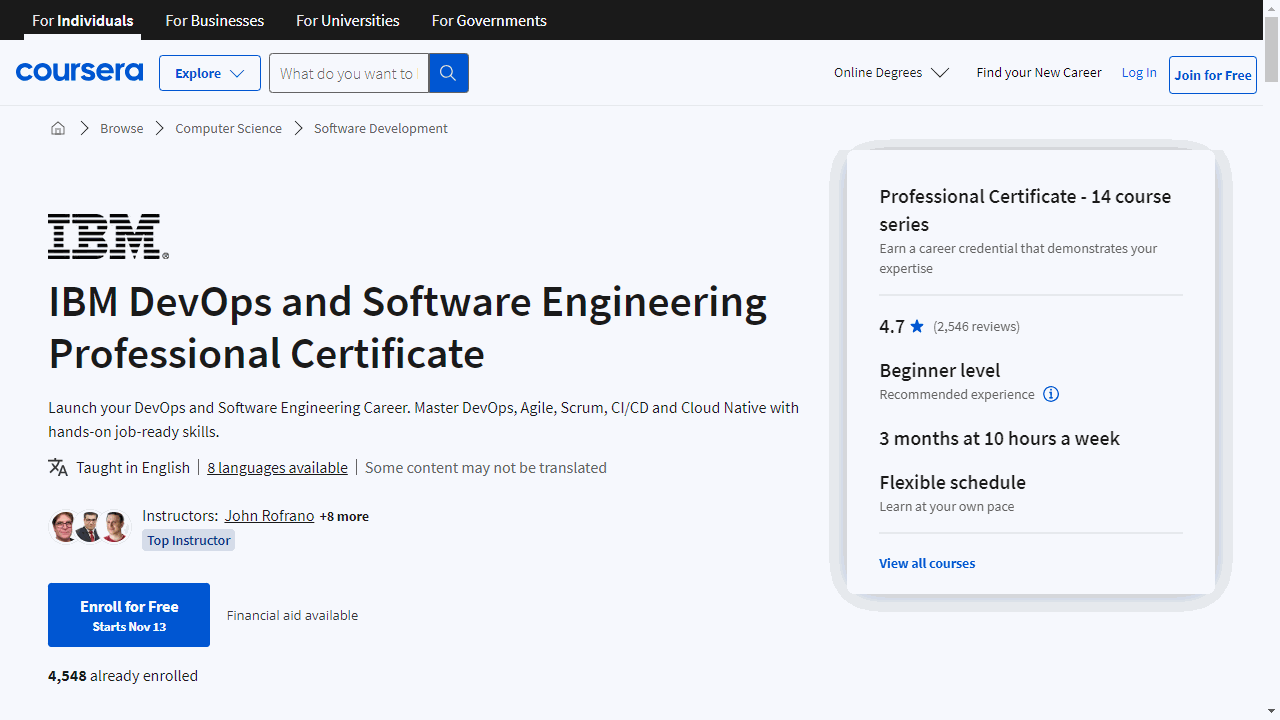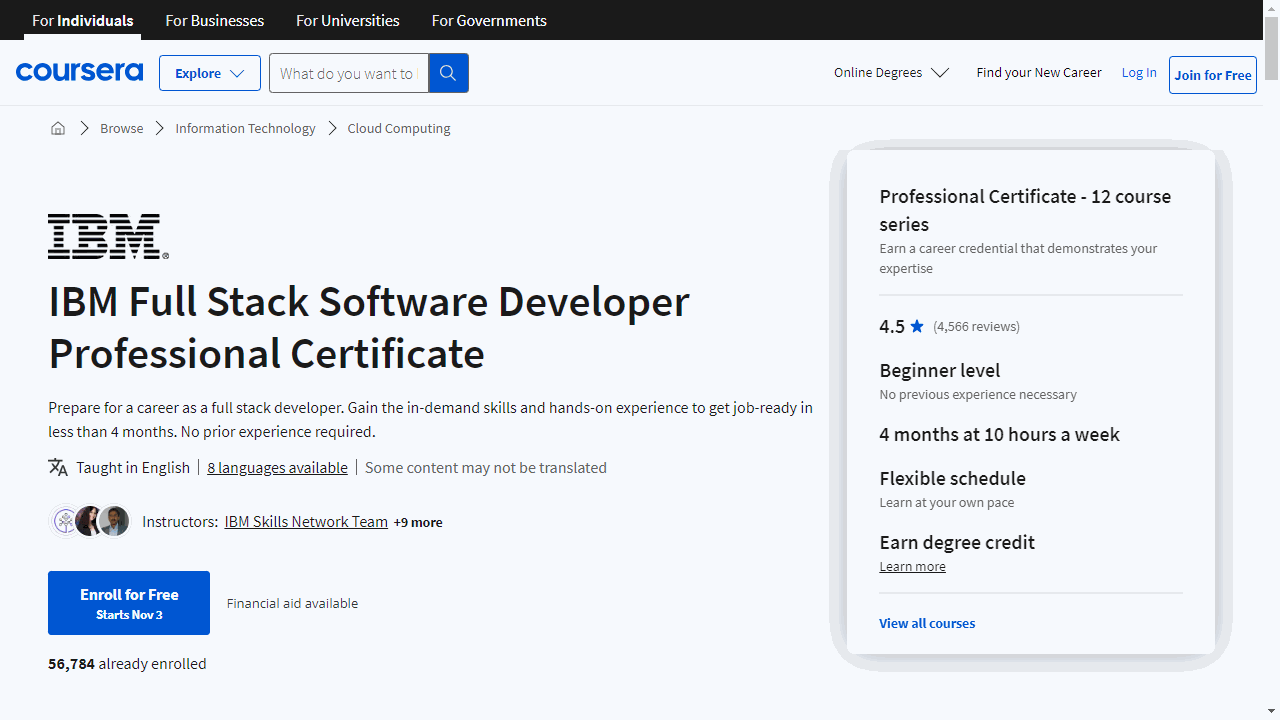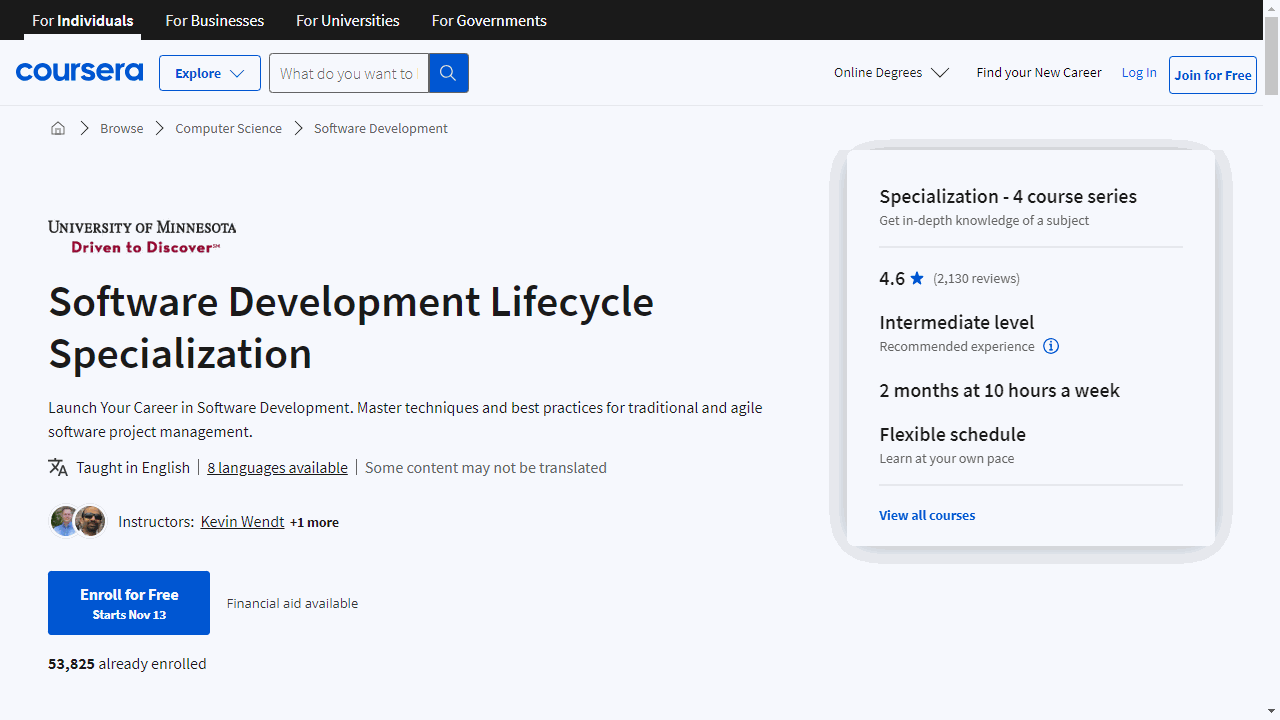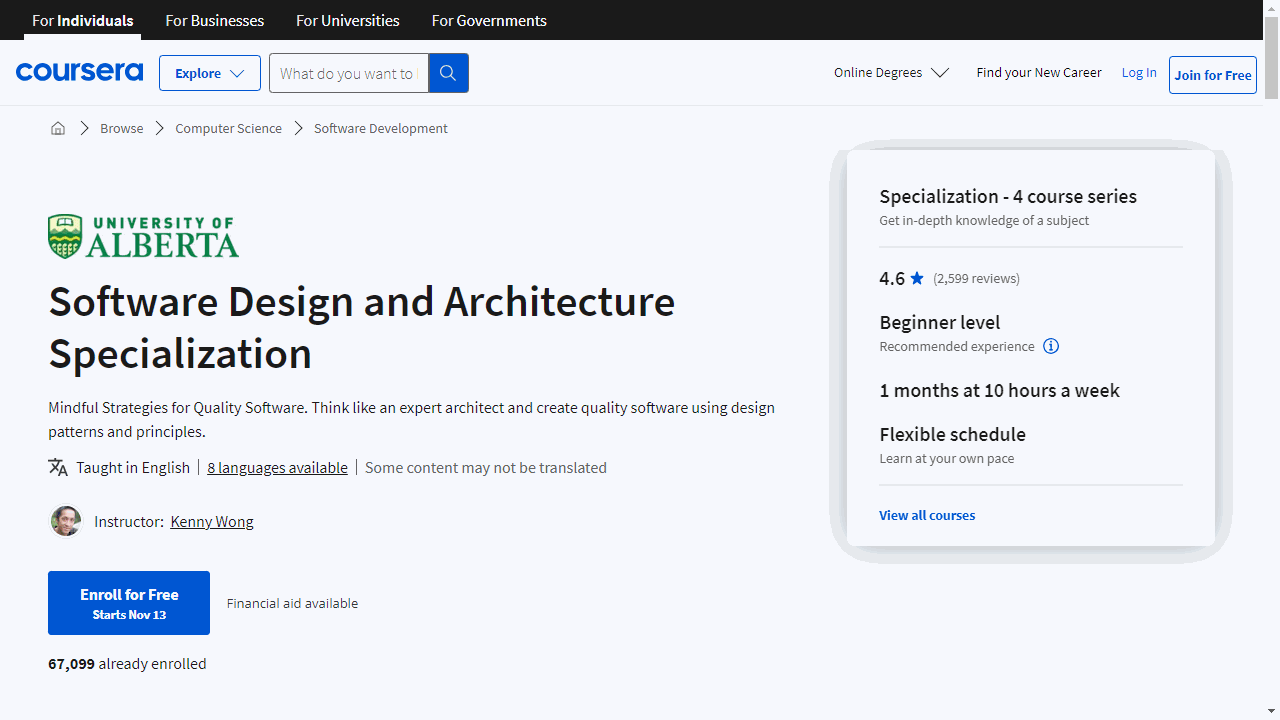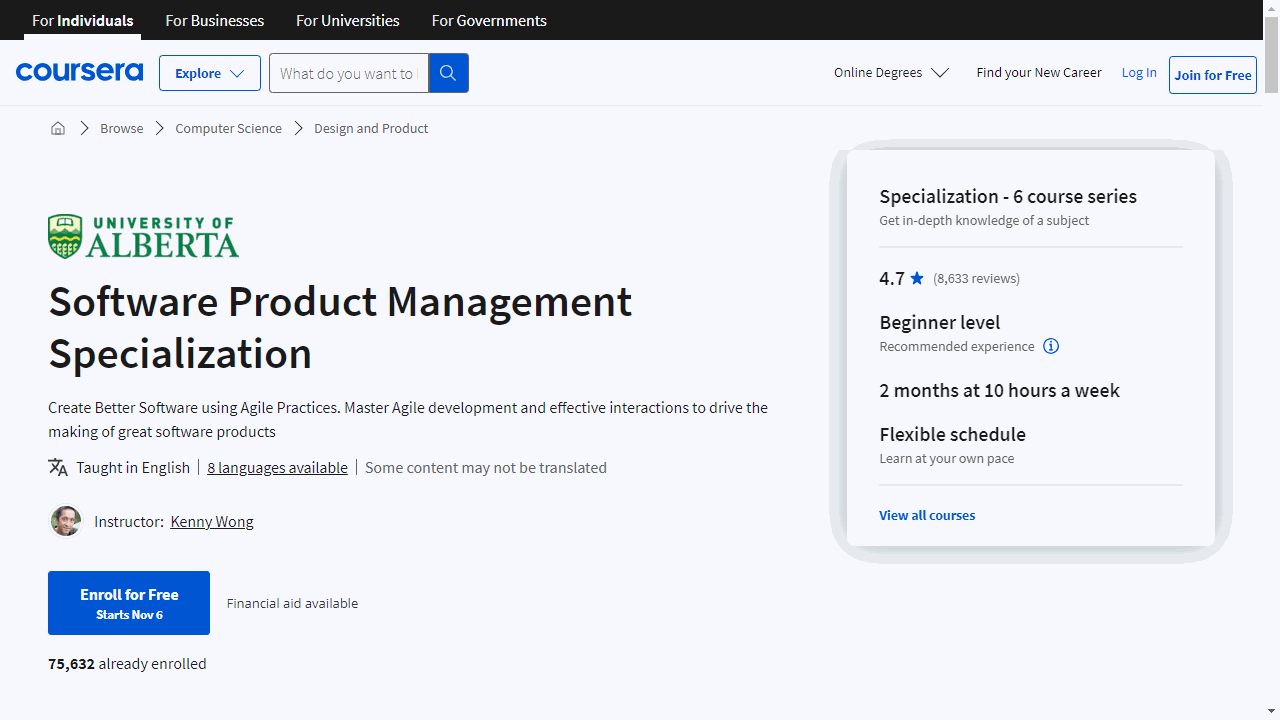Software engineering is the art and science of designing, developing, and maintaining software systems.
It’s a highly sought-after field with diverse career paths, offering opportunities to create innovative solutions that shape our world.
Learning software engineering can equip you with valuable skills for building web applications, mobile apps, games, and more.
Finding the right software engineering course on Coursera can be a challenge, with so many options available.
You’re looking for a program that’s comprehensive, engaging, and taught by experts, but also fits your learning style and goals.
For the best software engineering course overall on Coursera, we recommend the Applied Software Engineering Fundamentals Specialization by IBM.
This specialization covers the entire software development lifecycle, from requirements gathering to deployment and maintenance.
The courses are designed to be hands-on, with practical projects and labs that allow you to apply what you’ve learned in real-world scenarios.
This specialization is a great choice for beginners who want to gain a solid foundation in software engineering and for those with some experience who want to broaden their skillset.
While this is our top pick, there are many other great software engineering courses on Coursera.
Keep reading for more recommendations tailored to specific areas of software engineering, learning levels, and career goals.
Applied Software Engineering Fundamentals Specialization
The journey begins with “Introduction to Software Engineering,” where you’ll gain a solid foundation in software development.
You’ll learn about the Software Development Lifecycle (SDLC) and get acquainted with Agile and Scrum frameworks. The course doesn’t just teach theory; it includes practical labs where you’ll start programming with Python and explore the basics of IDEs.
It’s not only about coding, though. You’ll also get a clear picture of the various career opportunities within the field, directly from industry experts.
Moving on to “Hands-on Introduction to Linux Commands and Shell Scripting,” you’ll delve into the Linux operating system, a cornerstone of modern software development.
This course is beginner-friendly, guiding you through essential shell commands and scripting.
You’ll learn to navigate the Linux environment, manage files, and automate tasks with shell scripts.
The inclusion of a virtual Linux server for lab exercises ensures you can practice without any hassle.
For those looking to collaborate on code, “Getting Started with Git and GitHub” is invaluable.
It covers the fundamentals of version control, a critical skill for working in teams and contributing to open-source projects.
You’ll get comfortable with Git commands, repositories, and branches, and learn how to manage code changes and collaborate using GitHub.
The course culminates in a project that not only solidifies your learning but also enhances your professional portfolio.
“Python for Data Science, AI & Development” is where you’ll harness the power of one of the most sought-after programming languages.
This course is designed to take you from a beginner to a confident Python programmer.
You’ll work with data structures, learn logical programming, and use popular libraries like Pandas and Numpy for data manipulation.
The course is hands-on, with Jupyter Notebooks as your playground for exercises and projects.
Lastly, “Developing AI Applications with Python and Flask” offers a focused experience in applying your Python skills to the realm of AI.
You’ll build web applications and integrate AI functionalities using Watson AI libraries.
This course is project-based, allowing you to create a tangible, portfolio-worthy application by the end.
Software Engineering Specialization
The first course, “Software Engineering: Modeling Software Systems using UML,” is your entry point into the world of software development.
It emphasizes the importance of the requirement analysis phase of the SDLC.
By mastering UML, you’ll be equipped to create clear models that capture system requirements, ensuring that everyone involved—from clients to developers—has a shared understanding of the project.
This foundational knowledge is crucial for anyone looking to excel in software engineering.
Moving on to “Software Engineering: Implementation and Testing,” this course tackles the practical aspects of bringing your designs to life.
You’ll learn about various software development processes and how to choose the right one for your project.
The course also introduces defensive programming, a proactive approach to reduce bugs, and equips you with testing strategies to verify that your software performs as intended.
These skills are vital for producing reliable and robust software.
The final course, “Software Engineering: Software Design and Project Management,” rounds out your education by focusing on the bigger picture.
You’ll explore architectural and design patterns, which are essential for solving recurring design challenges.
Additionally, the course covers project management skills such as planning, scheduling, and cost estimating.
These are key competencies for anyone aspiring to lead software projects or teams.
While a basic understanding of object-oriented programming is recommended, the courses are designed to complement each other, allowing you to build your expertise as you progress.
Each course not only enhances your computer science skills but also hones your project management abilities, making you a well-rounded software engineer.
Java Programming and Software Engineering Fundamentals Specialization
This comprehensive 5-course specialization provides you with a solid foundation in core programming concepts and Java skills.
Java is not as easy to learn as Python, but it’s a powerful language used by many top companies for building enterprise applications.
The first course starts with the basics, teaching you how to think like a programmer and solve problems using JavaScript, HTML and CSS. You’ll learn key building blocks like functions, loops and conditionals while creating an interactive image filter web page.
From there, the courses quickly level up your skills.
The Java Programming course teaches you how to build algorithms, debug code and write programs that manipulate images and data. By the end, you’ll have analyzed CSV files to determine baby name popularity.
The third course expands your abilities using arrays, lists and structured data. You’ll read and write data files, perform quantitative analyses and create complex programs using multiple Java classes.
Next, you’ll take on even bigger challenges involving software design principles and interfaces. You’ll write programs that sort earthquake data and generate predictive text.
Finally, you’ll put all your new skills to work by creating movie and book recommendation systems, just like Netflix and Amazon use.
This will not be the easiest specialization you can take when first starting out, but it will give you a solid foundation in Java and software engineering.
IBM DevOps and Software Engineering Professional Certificate
This program is tailored to provide a well-rounded education, from the fundamentals of DevOps to the intricacies of cloud computing and beyond.
The “Introduction to DevOps” course is where you’ll start, gaining insight into the collaborative culture that drives high-performing teams.
You’ll explore essential practices like CI/CD and get a taste of cloud native architecture, setting a strong foundation for building robust applications.
Cloud computing is no longer just a buzzword, and the “Introduction to Cloud Computing” course ensures you understand why.
It covers everything from service models to the architecture of the cloud, preparing you to deploy applications with confidence.
The hands-on project at the end is a practical way to apply what you’ve learned.
Agile and Scrum methodologies are at the heart of modern software development, and “Introduction to Agile Development and Scrum” will help you master these approaches.
You’ll learn to plan sprints, manage backlogs, and improve team efficiency, all while fostering a collaborative environment.
For those who enjoy the technical side, “Hands-on Introduction to Linux Commands and Shell Scripting” offers a deep dive into the Linux operating system.
You’ll learn to navigate the terminal and write scripts that automate tasks, skills that are invaluable in today’s tech landscape.
Version control is essential, and “Getting Started with Git and GitHub” demystifies this process.
You’ll learn how to manage code changes and collaborate effectively using GitHub, a skill that’s critical for any software engineering role.
Python is a versatile language, and “Python for Data Science, AI & Development” introduces you to its potential. Whether you’re interested in data analysis, AI, or general development, this course provides the tools to start coding with Python.
The “Developing AI Applications with Python and Flask” course allows you to apply your Python skills to the exciting world of AI.
You’ll build web applications using Flask and integrate AI features, preparing you for the future of software development.
Containerization is changing the deployment landscape, and “Introduction to Containers w/ Docker, Kubernetes & OpenShift” ensures you’re up to speed.
You’ll learn how to use these tools to create flexible, scalable applications—a skill that’s increasingly important in the industry.
Microservices and serverless architectures are modern approaches to building applications, and “Application Development using Microservices and Serverless” guides you through these concepts.
You’ll learn to develop and deploy applications in a way that’s both efficient and scalable.
Testing is crucial, and “Introduction to Test and Behavior Driven Development” focuses on ensuring your code works as intended.
You’ll practice writing tests that keep your development process on track and your end product reliable.
Automation is a key component of DevOps, and “Continuous Integration and Continuous Delivery (CI/CD)” teaches you how to streamline the software delivery process.
You’ll explore tools and practices that make releasing software faster and more reliable.
Security is non-negotiable, and “Application Security for Developers and DevOps Professionals” equips you with the knowledge to safeguard your applications.
You’ll delve into security best practices and learn how to integrate security measures throughout the development lifecycle.
Lastly, “Monitoring and Observability for Development and DevOps” teaches you how to keep your applications running smoothly.
You’ll get hands-on with monitoring tools and learn the principles of observability, ensuring you can maintain and improve your systems effectively.
The capstone project is where everything comes together.
You’ll apply all the skills you’ve acquired to develop and deploy a real-world application, demonstrating your readiness for a career in DevOps and software engineering.
This certificate program is comprehensive, offering a blend of theoretical knowledge and practical experience.
It’s designed to prepare you for a variety of roles in the tech industry, making it a smart investment for your future.
IBM Full Stack Software Developer Professional Certificate
This certificate packs 12 hands-on coding courses that will take you from having zero experience to becoming a job-ready full stack developer.
The step-by-step curriculum covers everything you need - from core programming languages like Python and JavaScript to must-have developer tools like GitHub.
You’ll start by getting introduced to essential web development skills like HTML, CSS and JavaScript. Hands-on projects let you build interactive webpages and dynamic user interfaces.
From there, you’ll level up to advanced front-end frameworks like React and back-end technologies like Node.js.
Key courses guide you through building APIs, accessing databases, and connecting web apps using RESTful architecture. You’ll gain real-world experience deploying apps on the cloud with containers and serverless platforms.
Throughout the courses, you’ll build a portfolio of projects to showcase your new skills. And you’ll get familiar with in-demand dev practices like CI/CD pipelines, microservices, and Git workflows.
The certificate culminates in a capstone project where you’ll combine everything you’ve learned into one cloud-based full stack app. This is the perfect way to demonstrate your skills and have a professional project ready for job interviews.
If you’re looking to break into the field, this is one of the best online programming courses to start with.
Software Development Lifecycle Specialization
This specialization offers a comprehensive look into the practices and methodologies that are essential in the fast-paced world of software development.
The journey begins with “Software Development Processes and Methodologies.”
This course provides a clear overview of how software teams operate and the various methodologies they employ.
You’ll explore the pros and cons of traditional models like Waterfall and modern approaches like Agile and Lean.
The course equips you with the knowledge to engage in informed discussions and make strategic decisions regarding software development processes.
For those intrigued by the Agile revolution, the “Agile Software Development” course is a deep dive into why and how Agile methods have become a preferred choice in dynamic project environments.
You’ll learn about Scrum and XP, two of the most widely-used Agile frameworks, and apply these concepts through practical case studies.
This course does require a basic understanding of software development methodologies as a prerequisite.
Shifting focus to efficiency, the “Lean Software Development” course introduces you to principles derived from lean manufacturing that are applied to software development.
You’ll discover methods like Kanban and Value Stream Mapping, and innovative approaches such as Lean Startup and Design Thinking.
These concepts are not just theoretical; you’ll engage with case studies that simulate real-world application, preparing you to implement these techniques confidently.
Lastly, “Engineering Practices for Building Quality Software” is designed for those who understand that quality is non-negotiable.
This course delves into the engineering practices that support agile adaptability and overall software quality.
You’ll learn to measure and ensure the quality of your software, not just in terms of functionality but also in design and architecture.
Prior experience in software development and familiarity with UML diagrams will help you get the most out of this course.
Software Design and Architecture Specialization
This series of courses is designed to elevate your understanding of software design, from the principles of Java to the complexities of various architectural styles.
The journey begins with “Object-Oriented Design,” where you’ll delve into advanced Java concepts.
This course is essential for mastering the art of crafting flexible and maintainable software.
You’ll learn to apply object-oriented principles and express your designs using UML.
The practical Capstone Project puts your skills to the test, as you refine and document a Java codebase for an Android application.
Moving on to “Design Patterns,” you’ll discover the templates that guide the creation of reliable and scalable software.
This course empowers you to identify and implement the right design patterns for your projects.
You’ll also learn to recognize code smells, which are indicators of potential problems in your code, and how to address them.
The ability to critique and refactor Java code is a valuable skill you’ll gain from this course.
In “Software Architecture,” the focus shifts to the high-level structure of software systems.
You’ll compare architectural styles and understand their implications on your projects.
Creating UML diagrams and evaluating architectures using ATAM are just a couple of the practical skills you’ll acquire.
This course ensures you have the tools to design systems that are both functional and robust.
Lastly, “Service-Oriented Architecture” introduces you to the principles of designing web-based systems.
You’ll explore SOA, Web Services, and REST architecture, learning how to integrate and implement these approaches in your applications.
The course culminates in a Capstone Project where you’ll connect an Android application to a web service, solidifying your understanding of these essential concepts.
Software Product Management Specialization
The introductory course gives you an overview of the critical role software product managers play in delivering quality products. You’ll gain an understanding of Agile principles and how they lead to better software.
The second course dives into various software development processes and core Agile practices like Extreme Programming and Scrum. You’ll learn when to apply different process models.
The third course teaches you practical techniques to elicit and express software requirements through client interactions. You’ll maximize effectiveness through prototypes and adaptable requirements.
The fourth course covers turning requirements into plans. You’ll map user requirements into developer tasks, assess risks, and estimate work. These velocity-driven planning methods set you up for software project success.
As projects progress, reviews and metrics become critical. The fifth course focuses on monitoring techniques to align clients, plans, and production. Retrospectives and measurements will improve your process and product quality.
The specialization culminates in a capstone that gives you practical management experience through industry-inspired challenges. You’ll apply your new Agile skills to interact with simulated clients and hone your software requirements abilities.
By the end, you’ll have the confident expertise needed to thrive as a software product manager.
Also check our posts on:
